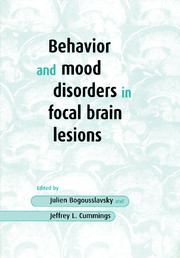Book contents
- Frontmatter
- Dedication
- Contents
- List of contributors
- Preface
- Acknowledgments
- 1 Emotional consequences of focal brain lesions: an overview
- 2 The evaluation of mood and behavior in patients with focal brain lesions
- 3 Methodological issues in studying secondary mood disorders
- 4 Emotional behavior in acute brain lesions
- 5 Depression and lesion location in stroke
- 6 Mood and behavior in disorders of the basal ganglia
- 7 Mania and manic-like disorders
- 8 Behavioral and emotional changes after focal frontal lobe damage
- 9 Disorders of motivation
- 10 Thalamic behavioral syndromes
- 11 Obsessive-compulsive disorders in association with focal brain lesions
- 12 Emotional dysprosody and similar dysfunctions
- 13 Temporal lobe behavioral syndromes
- 14 Neural correlates of violent behavior
- 15 Focal lesions and psychosis
- 16 Alterations in sexual behavior following focal brain injury
- 17 Anosognosia
- 18 Acute confusional states and delirium
- Index
18 - Acute confusional states and delirium
Published online by Cambridge University Press: 05 August 2016
- Frontmatter
- Dedication
- Contents
- List of contributors
- Preface
- Acknowledgments
- 1 Emotional consequences of focal brain lesions: an overview
- 2 The evaluation of mood and behavior in patients with focal brain lesions
- 3 Methodological issues in studying secondary mood disorders
- 4 Emotional behavior in acute brain lesions
- 5 Depression and lesion location in stroke
- 6 Mood and behavior in disorders of the basal ganglia
- 7 Mania and manic-like disorders
- 8 Behavioral and emotional changes after focal frontal lobe damage
- 9 Disorders of motivation
- 10 Thalamic behavioral syndromes
- 11 Obsessive-compulsive disorders in association with focal brain lesions
- 12 Emotional dysprosody and similar dysfunctions
- 13 Temporal lobe behavioral syndromes
- 14 Neural correlates of violent behavior
- 15 Focal lesions and psychosis
- 16 Alterations in sexual behavior following focal brain injury
- 17 Anosognosia
- 18 Acute confusional states and delirium
- Index
Summary
Introduction: terminology and definitions
The terms delirium, confused,and confusional statehave been used differently by neurologists and psychiatrists and authors in the past. The criteria for delirium in DSM-1V include (Folstein and Caplan, 1996):
a disturbance in consciousness with reduced ability to focus and sustain shifts of attention;
a change in cognition or the development of a perceptual disturbance that is not better accounted for by a preexisting, established, or evolving dementia;
the disturbance develops over a short period of time (usually hours to days) and tends to fluctuate during the course of the day;
there is evidence from the history, physical examination, or laboratory findings that the disturbance is caused by direct physiological consequences of a general medical condition.
These criteria incorporate several very different elements, including acuteness, altered thinking and concentrating, level of consciousness, and cause. Confusion is denned by Adams, Victor and Ropper (1997) as:
denoting the patient's incapacity to think with customary speed, clarity, and coherence. Its most conspicuous attributes are an inner sense of bewilderment, impaired attention and concentration, an inability to properly register immediate events and to recall them later, and a diminution of all mental activity including the normally constant inner ideation … Reduced perceptiveness with visual and auditory illusions and even hallucinations and paranoid delusions are variable features.
Confusion, in their terminology, is an essential component of delirium. Adams et al. use the term delirium to denote a special type of confusional state: ‘Delirium is marked by a prominent disorder of perception, terrifying hallucinations and vivid dreams, a kaleidoscopic array of strange and absurd fantasies and delusions, inability to sleep, a tendency to convulse, and intense emotional reactions.’ Lipowski defined the acute confusional state as ‘an organic mental syndrome featuring global cognitive impairment, attentional abnormalities, a reduced level of consciousness, increased or decreased psychomotor activity, and a disordered wake-sleep cycle’ (Lipowski, 1990; Young, 1998).
Some authors, including Adams et al. (1997), reserve the term delirium to describe an overactive state of heightened alertness that includes agitation, frenzied excitement, and trembling, while others, including many psychiatrists, include both hypoactive and hyperactive behavior with confusion within the spectrum of delirium. Many simply reserve the term delirium for behavioral and cognitive states that closely resemble the most familiar form of delirium - delirium tremens that develops in alcoholics after they withdraw from alcohol.
- Type
- Chapter
- Information
- Behavior and Mood Disorders in Focal Brain Lesions , pp. 520 - 532Publisher: Cambridge University PressPrint publication year: 2000



